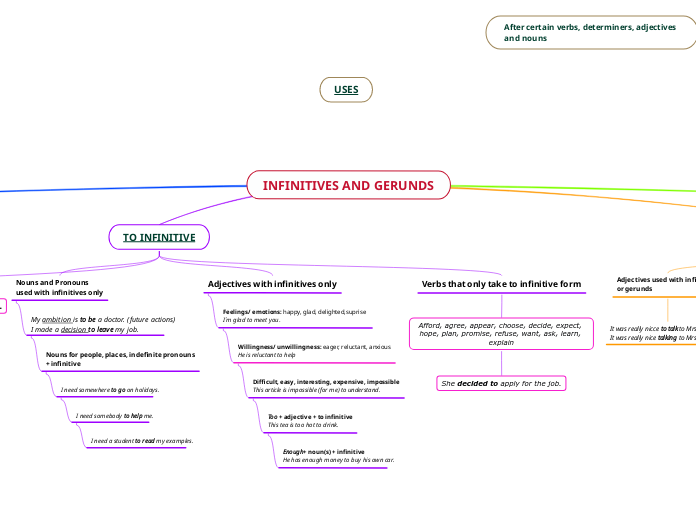INFINITIVES AND GERUNDS
ING FORMS
subject | object | complement
Swimming makes you fit.
The whole family has taken up cycling.
Her worst habit is lying.
Verbs that only take the -ing form
admit, anticipate, appreciate, avoid, consider, continue, excuse, imagine, mind, miss, postpone, practice, report, save, stand, suggest, understand, mention, etc.
They considered moving abroad.
Certain expressions followed by ING form
-He had fun fishing.
-They had difficulty finding a parking place.
-She spent her time practicing the piano.
TO INFINITIVE
subject | object | complement
To give is better than to receive.
The most important thing is to learn.
I decided not to go.
Nouns and Pronouns
used with infinitives only
My ambition is to be a doctor. (future actions)
I made a decision to leave my job.
Nouns for people, places, indefinite pronouns
+ infinitive
I need somewhere to go on holidays.
I need somebody to help me.
I need a student to read my examples.
Adjectives with infinitives only
Feelings/ emotions: happy, glad, delighted,suprise
I´m glad to meet you.
Willingness/ unwillingness: eager, reluctant, anxious
He is reluctant to help
Difficult, easy, interesting, expensive, impossible
This article is impossible (for me) to understand.
Too + adjective + to infinitive
This tea is too hot to drink.
Enough+ noun(s) + infinitive
He has enough money to buy his own car.
Verbs that only take to infinitive form
Afford, agree, appear, choose, decide, expect, hope, plan, promise, refuse, want, ask, learn, explain
She decided to apply for the job.
GERUNDS OR INFINITIVES
Adjectives used with infinitives
or gerunds
It was really nicce to talk to Mrs. Anderson.
It was really nice talking to Mrs. Anderson.undefined
Difference in meaning
-I like speaking French because it´s a such a beautiful language ( I like the experience of speaking French and the way makes me feel when I speak the language). -I like to speak French when I´m in France (I prefer the option of speaking French when I am in France)
-I really regret getting that tattoo when I was eighteen (=feel sorrow about the past). -We regret to inform you of delays in today's service (=announce bad news).
Nouns and pronouns used
with infinitives or gerunds
Did you have a problem finding the place?
Julia had a talent for acting. (prep + gerund)
COMPLEX FORMS
INFINITIVES FORMS
(to) do | I need to talk to John (present or future) ACTIVE
(to) be done | He wants to be sent home (present or future) PASSVE
(to) be doing | They seem to be having fun (in progress now) ACTIVE
(to) have done | I'm glad to have had the honour of meeting you (earlier action) ACTIVE
(to) have been done | She claims to have been sacked for... (earlier action) PASSIVE
(to) have been doing | They thought to have been hidding in mountains. (earlier past) ACTIVE
ING FORMS
doing | She migted marrying to young. (any time) ACTIVE
being done | He decided being offered a bride (any time) PASSIVE
having done | He's accused of having robbed hundreds of people. (earlier action) ACTIVE
having been done | She did it after having been warned of ... (earlier action) PASSIVE
SIMPLE, CONTINUOUS AND PERFECT
We use the perfect infinitive or the perfect gerund to emphasize that the action is completed in the past.
SIMPLE GERUND VS PERFECT GERUND
There is usually no difference because the context usually makes it clear when the action happened
He denied stealing the money. ( = it is clear the money was stolen before denying it)
He denied having stolen the money
But sometimes there is a difference in meaning between using them
He denied being married. ( = he denied that he was married now , at the time of denial)
He denied having been married (= he denied that he had been married before, in the past)
SIMPLE INFINITIVE VS PERFECT INFINITIVE
Sometimes there is no difference between using them
It was stupid of me to say anything on Twitter
It was stupid of me to have said anything on Twitter
But sometimes there is a difference of meaning between using them
I´m very glad to work here (now)
I´m very glad to have worked here (in the past)
